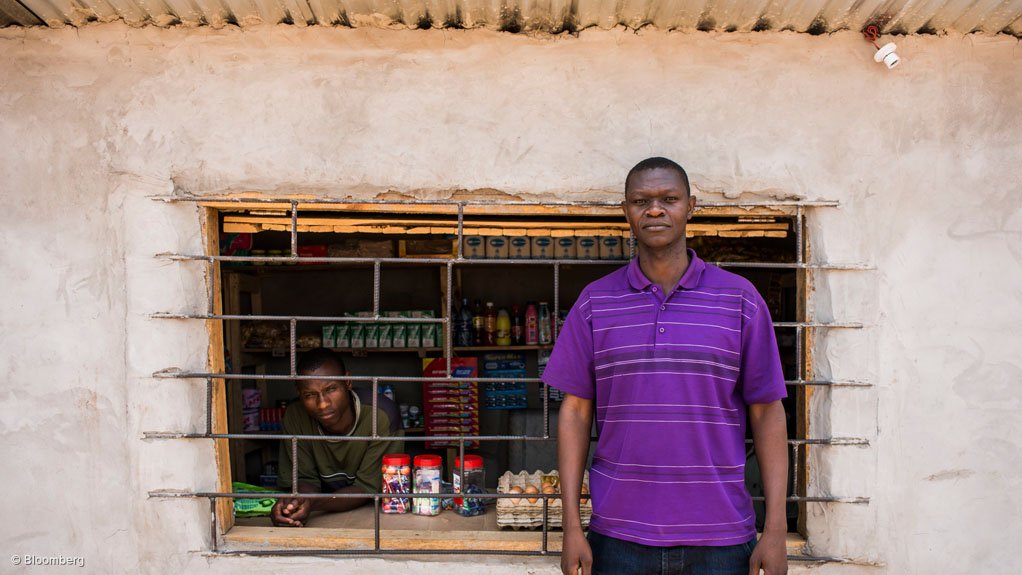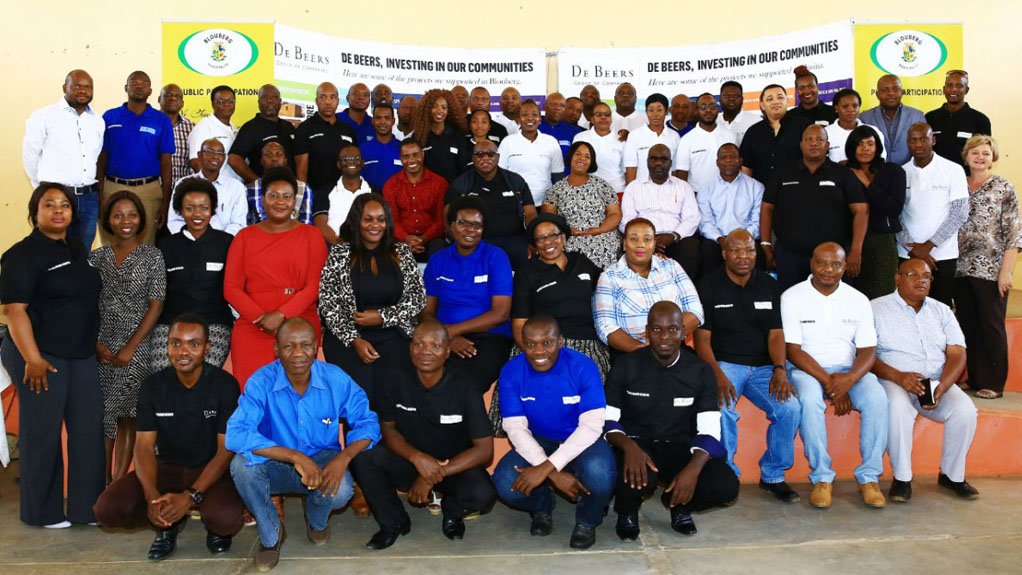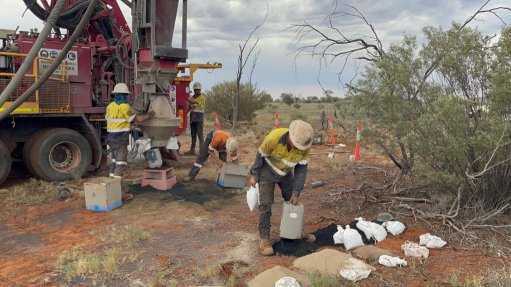Diamond company invests in mining communities



EMPOWERING ENTREPRENEURS The Venetia mine is working to ensure that local entrepreneurs and businesses near the mine receive training and mentorship
Photo by Bloomberg
SOCIAL CAPITAL Investing in communities and involving them in important discussions is crucial to sustainable mining operations
There is a new language to be learnt and a new mindset to be adopted in South Africa’s opencast mining industry, says diamond mining company De Beers’ Limpopo-based Venetia mine GM, Benford Mokoatle.
As many underground resources have been depleted in the region, mining companies have been forced to invest in opencast mining. This may not provide the scale of production previously achieved through underground mining, but it does provide a cost-effective alternative to boost the industry and the economy.
There are conflicting views regarding security of tenure, explains Mokoatle, adding that this is warranted, as “any business would want to ensure security before they plough their money” into the industry. However, he explains that government needs stakeholders and investors to invest their money in the South African mining industry, while making a “meaningful impact and leaving sustainable legacies”.
The ongoing conversations are enabling stakeholders, including investors and mining companies, to become more knowledgeable about the various aspects of the industry. However, Mokoatle points to the missing voice of the community. “Discussions are happening everywhere, but the voice of the community is not there . . . We are realising that a third capital is important – social capital,” he explains.
Investing in Social Capital
Mokoatle emphasises that there is no way of generating sustainable finances without effective and competent employees that will drive the organisation forward. He adds that organisations must aim for coexistence in the social space with government, stakeholders and surrounding communities.
De Beers realised that organisations cannot generate finances and free cash flow without people driving productivity; this enabled the company to redefine employees as human capital and assets. Discussions about the value of skills and employee value propositions further allowed for an emphasis on human capital, which led to the company defining and emphasising social capital.
Mokoatle says the social space cannot be left solely to government, adding that government is an important part of the social capital equation, but should assume the role of ensuring that policies are designed to equally benefit the three types of capital – financial, human and social. Discussions on this aspect are essential and coexistence between businesses, government, stakeholders and communities cannot be ignored. “The environment must be one that encourages that coexistence with communities and government,” Mokoatle explains.
Creating Opportunities
The Venetia mine management assessed the environment in Limpopo and realised the critical shortage of labour skills. Mokoatle says many people in surrounding communities have been trained by Venetia, but they “disappear” afterwards, migrating to Johannesburg or Cape Town.
As a result, Venetia is left with people who, in the social capital context, are unskilled entrepreneurs, as opposed to labourers. This created additional challenges, as different programmes and approaches would have to be devised to upskill remaining community members, he points out.
To deal with this challenge, Mokoatle explains that Venetia mine subsequently prioritised business opportunities that would benefit the communities surrounding Venetia and boost their economies. These opportunities occurred within the business and could be set aside for local broad-based black economic-empowerment businesses, and include security services, the installation of field isolators, specialised welding and metal work, and the repair and maintenance of machinery, such as water bowsers.
This encouraged the development of a different skill set, while “giving these communities hope and meaning, which would otherwise not have existed”. Creating business opportunities would stimulate the local economy and create employment opportunities for local communities.
Mokoatle says creating business opportunities for Venetia’s surrounding communities meant investing in them while training and developing entrepreneurial skills. Different approaches were taken to develop different types of businesses, which, he explains, fostered a sense of coexistence between Venetia and the surrounding communities.
“The same small businesses that we are seeking to establish will create small, sustainable jobs and get the community going and, eventually, the country going . . . We want people who will drive an organisation and make a difference. The experience in the country is there – all we need to do is ensure that we use it meaningfully to create coexistence between businesses, government and communities.”
Mokoatle says companies cannot wait for community investment initiatives to come to them – they must devise strategies on how to create coexistence independently. “This is why we have been appointed in our positions as captains of industry – to go out there, identify what needs to be done differently, put plans in place and implement them accordingly to ensure the sustenance of financial, human and social capital.”
Subsequent to his interview with Mining Weekly, Mokoatle resigned from his position as Venetia Mine GM, and has been replaced by Gerrie Nortje, as of October 1.
Article Enquiry
Email Article
Save Article
Feedback
To advertise email advertising@creamermedia.co.za or click here
Announcements
What's On
Subscribe to improve your user experience...
Option 1 (equivalent of R125 a month):
Receive a weekly copy of Creamer Media's Engineering News & Mining Weekly magazine
(print copy for those in South Africa and e-magazine for those outside of South Africa)
Receive daily email newsletters
Access to full search results
Access archive of magazine back copies
Access to Projects in Progress
Access to ONE Research Report of your choice in PDF format
Option 2 (equivalent of R375 a month):
All benefits from Option 1
PLUS
Access to Creamer Media's Research Channel Africa for ALL Research Reports, in PDF format, on various industrial and mining sectors
including Electricity; Water; Energy Transition; Hydrogen; Roads, Rail and Ports; Coal; Gold; Platinum; Battery Metals; etc.
Already a subscriber?
Forgotten your password?
Receive weekly copy of Creamer Media's Engineering News & Mining Weekly magazine (print copy for those in South Africa and e-magazine for those outside of South Africa)
➕
Recieve daily email newsletters
➕
Access to full search results
➕
Access archive of magazine back copies
➕
Access to Projects in Progress
➕
Access to ONE Research Report of your choice in PDF format
RESEARCH CHANNEL AFRICA
R4500 (equivalent of R375 a month)
SUBSCRIBEAll benefits from Option 1
➕
Access to Creamer Media's Research Channel Africa for ALL Research Reports on various industrial and mining sectors, in PDF format, including on:
Electricity
➕
Water
➕
Energy Transition
➕
Hydrogen
➕
Roads, Rail and Ports
➕
Coal
➕
Gold
➕
Platinum
➕
Battery Metals
➕
etc.
Receive all benefits from Option 1 or Option 2 delivered to numerous people at your company
➕
Multiple User names and Passwords for simultaneous log-ins
➕
Intranet integration access to all in your organisation




















